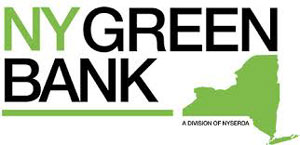As government subsidies for renewable energy become more scarce and politically tinged, the industry is turning to Green Bonds and Green Banks to get it on a path of independent, reliable financing.
Last week, the first Green Bank Academy was held – "a unique opportunity for state energy and finance officials from around the country to learn about and discuss the establishment and coordination of state "green" banks," it says on the website. Attendees left the Academy "with turnkey solutions needed to build green banks in their states with shared principles for coordination and standardization."
Leaders from over 11 states that are at various stages of developing their own green banks attended: California, Hawaii, Illinois, Kentucky, Maryland, Massachusetts, Minnesota, New Hampshire, Washington, NY and Connecticut.

Congressman Van Hollen (D-MD) will soon re-introduce federal Green Bank legislation after incorporating input from attendees at the event. It would be capitalized with up to $50 billion worth of Green Bonds issued by the Treasury.
The Academy defines a Green Bank as: a state-sponsored non-profit lender that provides long term, low-cost financing support. Its purpose is to increase public-private investing in clean energy while giving consumers cheaper energy solutions.
Limited public funds would leverage private investment, help standardize clean energy financing practices and lower the price of clean energy for consumers.
Loans, loan guarantees, debt securitization and insurance would be available to creditworthy clean energy and energy efficiency projects, with the goal of advancing "the national objectives of achieving greater energy independence, abating climate change, reducing the delivered costs of clean energy to consumers and stimulating job creation," explains Van Hollen.
Connecticut was the first to launch a Green Bank, but it is small, and New York followed with one of significant size – $1 billion.
Although President Obama has expressed support for a national Green Bank, including it in one of his budgets, it hasn’t gotten traction. The UK’s Green Investment Bank began operating last year with $999 million.
"Ultimately, the Green Bank Academy is about more than creating a few more innovative institutions. Equally important, this week’s discussion is about how to make large-scale progress on big problems when the national government has gone absent," says Mark Muro from the Brookings Institution, co-host of the Academy.
"There are major financing gaps in almost all clean energy markets, and you know something has to give, since the whole subsidy-based develop-deployment model of the last decade is really probably collapsing, and not only are generous subsidies under widespread threat of attack, but in fact they’ve already been severely downsized," Muro told E&E News.
"The idea is to really bring a fresh approach to energy that emphasizes not trying to pick a winner but giving the marketplace and the average family and the average business a choice about what their own needs are and then trying to harness competitive market pressures to bring down energy costs," Daniel Esty explains to E&E. As Commissioner of Connecticut’s Department of Energy and Environmental Protection, he helped develop the state’s green bank.
Last year, Connecticut’s Green Bank – Clean Energy Finance and Investment Authority (CEFIA) – financed 1,160 projects and attracted over $180 million in private capital based on $41 million in state funds, resulting in 26.7 megawatts of new clean energy, reports E&E.
The bank aggregates energy efficiency projects to attract investors and has
funded combined heat and power projects, a 15 MW fuel cell park and residential and business solar systems.
Here is the Green Bank Academy website:

Good to see social values being institutionalized in the finance sector in the USA – we have some catching up to do with EU. Let’s see it at scale! Congrats to Brookings Institution, Coalition for Clean Energy Financing and CT Clean Energy&Fin Dept.